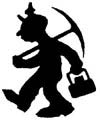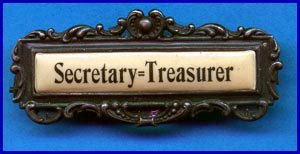



















United Mine Workers of America (1900 - 1908)
Strike of 1899-1900 As reported by The Blossburg Advertiser December 1898 through December 1899.
William B. Wilson worked closely as a friend and ally of UMWA president John Mitchell. Soon after Wilson took the secretary-treasurer position in 1900, the UMWA organized a strike that included Tioga County. At this point, Mary Harris "Mother" Jones came to Arnot to assist in the strike. It is interesting to the researchers that three of our primary sources, Babson's biography, Wilson's manuscript, and Flashbacks, a brief history by Phyllis Swinsick of the southeastern section of Tioga County, do not overlap in their tellings of the strike of 1899-1900, despite its national and local significance.
Babson writes, "...In behalf of the miners of Tioga County, Mr. Wilson took charge of the situation resulting from a prolonged lockout. A change of managers of a mine property and the abrogation by the new manager of the conference system...resulted in a lockout. It was a long and bitter contest in which Mr. Wilson, while steadily working to bring the opposing forces together and to re-establish the conference plan, sometimes lost the confidence of some of the more radical of the men he was leading."
In her autobiography, Mother Jones wrote that the coal company tried to bribe Wilson :
"Come in," said Mr. Wilson.
Three men entered. The looked at me uneasily and Mr. Wilson asked me to step in an adjoining room. They talked the strike over and called President Wilson's attention to the fact that there were mortgages on his little home, held by the bank which was owned by the coal company, and they said, "We will take the mortgage off your home and give you $25,000 in cash if you will just leave and the strike die out."
I shall never forget his reply:
"Gentlemen, if you come to visit my family the hospitality of the whole house is yours. But if you come to bribe me with dollars to betray my manhood and my brothers who trust me, I want you to leave this door and never come here again."
The strike lasted a few weeks longer. Meantime, President Wilson, when strikers were evicted, cleaned out his barn and took care of the evicted miners until homes could be provided. One by one he killed his chickens and his hogs. Everything that he had he shared. He ate dry bread and drank chicory [instead of coffee]. He knew every hardship that the rank and file of the organization knew. We do not have such leaders now." (p. 37-38)
Wilson created all the documents issued for publication to sway and maintain public sympathy to the miners' cause, but he credits Mitchell with the success of the strike, "Through [the Republican National Committee], political pressure was brought to bear upon the financial interests and a settlement arrived at. It was much below that we had demanded and gave no recognition of the union, but we believed it better to confirm the improvements it gave than to take the chances of losing all by continuing the strike."
Mother Jones, on the other hand, used more radical tactics in the 1899-1900 strike, probably appealing to the radical miners who were disillusioned with Wilson's conservative actions. According to Swinsick, once Jones arrived in Arnot, she led the women in a parade to the mines where "they raised a howling ruckus," using brooms, mops, pots, and pans. "The sheriff was called to stop them, but what man ever succeeded in intimidating a bunch of determined females? Scabs were driven off helter skelter and the women continued their loud and lively campaign day after day. And the men became converted to other tactics."
The strike, the longest in Tioga County history at eight months, was finally resolved in Feb. 1900 after a hard winter.
Miners' Advocate
When Wilson took charge of the treasury of the UMWA it contained $16,000 in poorly kept accounts. When he turned it over to his successor it contained over $1,027,000. By that time the UMWA had grow to have a membership of over 304,000.
Through the UMWA, Wilson sought protection from injury for workers, a shocking concept at the time. Wilson believed, "If a person wants anything, he ought to be willing to pay for the cost of producing it, including the cost of the accidents to human beings." He used this argument in 1901 at hearings before a Pennsylvania Senate committee, resulting in the first Pennsylvania worker's compensation laws, which became a model for similar laws across the U.S.
During the next large Pennsylvania coal strike in 1902, the UMWA advocated closed-shop policies, but the operators refused. The UMWA eventually lost on this point. Wilson explained the issue:
Union men generally believe that there is no such thing as an open shop except on a small and insignificant scale. [Ed. note: Open shop: a workplace in which employees have the choice of joining the union and having its collective bargaining process. Closed shop: a workplace which all employees are required to be union members.] An operation either becomes all union or all non-union and is ... promulgated principally by antagonistic employers who do not hesitate to discharge a union man whenever they find him in their establishment.... It is generally acknowledged that the aggressive power of a union in periods of industrial activity and its defensive strength during periods of depression maintain a higher standard of living not only for themselves but for non-union men in the same line of work than would be obtained with out it. Reasoning from that standpoint, they insist that common honesty should teach the person who receives the benefits brought about by the union to pay his share to maintain it. [Ed. note: Wilson's claim of higher standards of living for non-union workers in an area where many are unionized continues to hold true in current sociological research. For references, e-mail Heidi I. Jones.]
Wilson also argued that corporations are fundamentally associations of capitalists who band together and hire collectively. He reasoned that workers should therefore also act collectively. "Any workmen who remain outside the terms of a collective bargain destroy the equality of the bargaining power to the extent of their numbers," he wrote.
In 1908, Mitchell declined to run for the UMWA presidency again. Wilson became a candidate but lost by a small margin. He continued to be active in the American Federation of Labor (now part of the AFL-CIO) as a delegate and as president or secretary of the President's Report committee. He noted that the union movement was involved in more than just issues of wages, hours, and working conditions: "community health; sanitation and safety; vocational diseases and prevention...; prenatal care; mothers' pensions; child labor; protection of women and children in industry; compulsory education and free text books; vocational education; medical attention and hospital care for the injured...; employers' liability and workmen's compensation; the social aspects of wages and the hours of labor; the effect of immigration on the industrial, economic and political life of the nation; the virtues and faults of socialism and numerous other -isms..."
The Wilson index:
After months of terrible hardships the strike was about won. The mines were not working. The spirit of the men was splendid. [United Mine Workers District] President Wilson had come home from the western part of the state. I was staying at his home. The family had gone to bed. We sat up late talking over matters when there came a knock at the door. A very cautious knock.
• William Bauchop Wilson Main Page
• Coming to America
• Growing up in Arnot, Pennsylvania
• The Next 20 Years
• Congress
• Secretary of Labor
• 1921 - 1934
• The Family
• Ferniegair Farm Blossburg, Pennsylvania
• United Mine Workers Pins & Ribbons
• Poetry By W.B. Wilson
• Bibliography